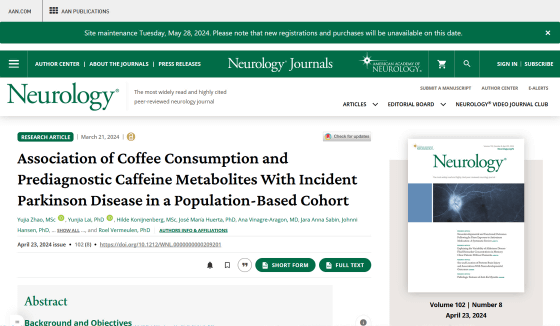Drinking coffee may help prevent Parkinson's disease

Association of Coffee Consumption and Prediagnostic Caffeine Metabolites With Incident Parkinson Disease in a Population-Based Cohort | Neurology
https://www.neurology.org/doi/10.1212/WNL.0000000000209201

Drinking Coffee May Help Protect Against Parkinson's, Study Says: ScienceAlert
https://www.sciencealert.com/drinking-coffee-may-help-protect-against-parkinsons-study-says
There are various theories about whether drinking coffee is good for your health, but it has been reported that espresso helps prevent the accumulation of substances that cause Alzheimer's disease , and that people who drink two to three cups of coffee a day have a lower risk of death .
The international research team analyzed data from the European longitudinal cohort study EPIC4PD, which included 184,024 participants who were followed for a median of 13 years and up to 20 years. The participants were recruited from six countries: Sweden, the UK, the Netherlands, Germany, Spain and Italy, and participated in the study between 1992 and 2000.
Of the subjects, 593 were confirmed to have developed Parkinson's disease during the follow-up period. In addition, 93% of all subjects were coffee drinkers, and the top 25% of coffee drinkers tended to be male, smoker, young, and consume more alcohol.

The analysis found that coffee drinkers have a lower risk of developing Parkinson's disease compared to non-coffee drinkers. The top 25% of coffee drinkers had a 40% lower risk of developing Parkinson's disease compared to non-coffee drinkers. The risk reduction measured among all coffee drinkers varied from 5 to 63% across countries.
Analysis of blood samples from Parkinson's patients also found that concentrations of caffeine and its metabolites
Parkinson's disease is a neurodegenerative disease caused by a decrease in neurons in the substantia nigra of the brain, resulting in a decrease in the neurotransmitter dopamine. Past research has suggested that caffeine's effect of promoting dopamine secretion in the brain may be related to a reduced risk of Parkinson's disease.

'The neuroprotective effect of coffee is consistent with our findings that revealed an inverse association between caffeine, paraxanthine and theophylline and the incidence of Parkinson's disease,' the research team said. 'Coffee is the most widely consumed psychoactive drug in the world. Elucidating the biological effects of caffeine on Parkinson's disease not only has important public health implications, but also improves our understanding of the causes of Parkinson's disease and fosters potential prevention strategies.'
Related Posts:







